Related Research Articles
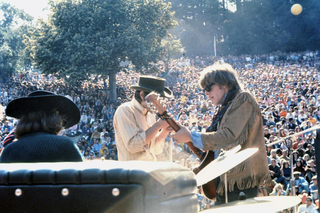
The Summer of Love was a social phenomenon that occurred during the summer of 1967, when as many as 100,000 people, mostly young people sporting hippie fashions of dress and behavior, converged in San Francisco's neighborhood of Haight-Ashbury. More broadly, the Summer of Love encompassed the hippie music, hallucinogenic drugs, anti-war, and free-love scene throughout the West Coast of the United States, and as far away as New York City.

Woodstock Music and Art Fair, commonly referred to as Woodstock, was a music festival held during August 15–18, 1969, on Max Yasgur's dairy farm in Bethel, New York, United States, 40 miles (65 km) southwest of the town of Woodstock. Billed as "an Aquarian Exposition: 3 Days of Peace & Music" and alternatively referred to as the Woodstock Rock Festival, it attracted more than 400,000 attendees. Thirty-two acts performed outdoors despite overcast and sporadic rain. It was one of the largest music festivals in history, and became synonymous with the counterculture of the 1960s.

A hippie, also spelled hippy, especially in British English, is someone associated with the counterculture of the 1960s, originally a youth movement that began in the United States during the 1960s and spread to different countries around the world. The word hippie came from hipster and was used to describe beatniks who moved into New York City's Greenwich Village, in San Francisco's Haight-Ashbury district, and Chicago's Old Town community. The term hippie was used in print by San Francisco writer Michael Fallon, helping popularize use of the term in the media, although the tag was seen elsewhere earlier.

Abbot Howard Hoffman was an American political and social activist who co-founded the Youth International Party ("Yippies") and was a member of the Chicago Seven. He was also a leading proponent of the Flower Power movement.

Steal This Book is a book written by Abbie Hoffman. Written in 1970 and published in 1971, the book exemplified the counterculture of the sixties. The book sold more than a quarter of a million copies between April and November 1971. The number of copies that were stolen is unknown.

The Youth International Party (YIP), whose members were commonly called Yippies, was an American youth-oriented radical and countercultural revolutionary offshoot of the free speech and anti-war movements of the late 1960s. It was founded on December 31, 1967. They employed theatrical gestures to mock the social status quo, such as advancing a pig as a candidate for president of the United States in 1968. They have been described as a highly theatrical, anti-authoritarian and anarchist youth movement of "symbolic politics".
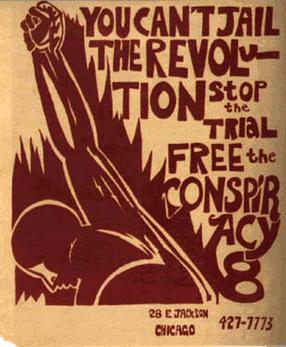
The Chicago Seven, originally the Chicago Eight and also known as the Conspiracy Eight or Conspiracy Seven, were seven defendants - Rennie Davis, David Dellinger, John Froines, Tom Hayden, Abbie Hoffman, Jerry Rubin, and Lee Weiner - charged by the United States Department of Justice with conspiracy, crossing state lines with intent to incite a riot, and other charges related to anti-Vietnam War and 1960s counterculture protests in Chicago, Illinois during the 1968 Democratic National Convention. The Chicago Eight became the Chicago Seven after the case against co-defendant Bobby Seale was declared a mistrial.

Flower power was a slogan used during the late 1960s and early 1970s as a symbol of passive resistance and nonviolence. It is rooted in the opposition movement to the Vietnam War. The expression was coined by the American Beat poet Allen Ginsberg in 1965 as a means to transform war protests into peaceful affirmative spectacles. Hippies embraced the symbolism by dressing in clothing with embroidered flowers and vibrant colors, wearing flowers in their hair, and distributing flowers to the public, becoming known as flower children. The term later became generalized as a modern reference to the hippie movement and so-called counterculture of drugs, psychedelic music, psychedelic art and social permissiveness.

Woodstock is a 1970 American documentary film of the watershed counterculture Woodstock Festival which took place in August 1969 near Bethel, New York.
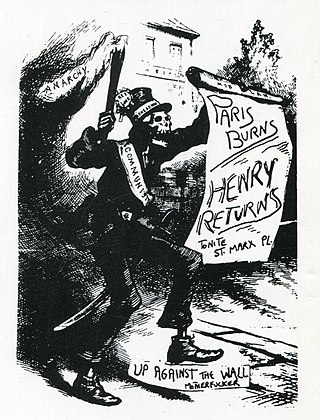
Up Against the Wall Motherfucker, often shortened as The Motherfuckers or UAW/MF, was a Dadaist and Situationist anarchist affinity group based in New York City. This "street gang with analysis" was famous for its Lower East Side direct action.

Flower child originated as a synonym for hippie, especially among the idealistic young people who gathered in San Francisco and the surrounding area during the Summer of Love in 1967. It was the custom of "flower children" to wear and distribute flowers or floral-themed decorations to symbolize ideals of universal belonging, peace, and love. The mass media picked up on the term and used it to refer in a broad sense to any hippie. Flower children were also associated with the flower power political movement, which originated in ideas written by Allen Ginsberg in 1965.

Max Bernard Yasgur was an American farmer. He was the owner of the 600-acre (240 ha) dairy farm in Bethel, New York, where the Woodstock Music and Art Fair was held on August 15–18, 1969. He sold his farm in 1971 and retired to Florida, where he died in 1973.

The Hog Farm is an organization considered America's longest running hippie commune. Beginning as a collective in North Hollywood, California, during the 1960s, a later move to an actual hog farm in Tujunga, California gave the group its name. Founded by peace activist Hugh Romney and his actress wife Jahanara Romney, the Hog Farm evolved into a "mobile, hallucination-extended family", active internationally in both music and politics. A documentary short The Hog Farm Movie, filmed in 1967/68, was digitally restored in July 2019.

Flashback is a 1990 American adventure comedy film starring Dennis Hopper, Kiefer Sutherland, and Carol Kane. The film is written by David Loughery and directed by Franco Amurri.
Zippie was briefly the name of the breakaway Yippie faction that demonstrated at the 1972 Republican and Democratic Conventions in Miami Beach, Florida. The origin of the word is an evolution of the term Yippie, which was coined by the Youth International Party in the 1960s.
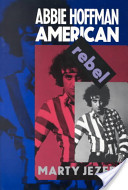
Abbie Hoffman: American Rebel is a biography of radical Abbie Hoffman, by Marty Jezer. It was published in 1992 by Rutgers University Press. Los Angeles Times reviewer Jonathan Kirsch, noting that Jezer had been Hoffman's "cohort" and "a veteran of 'the Woodstock Nation'", found the book to be "sympathetic but curiously aloof" and opined that it did not succeed in getting "behind the mask of comedy that Hoffman invariably presented to the world." The New York Times reviewer Todd Gitlin called the book "a solid account of the life of an inventive, destructive luftmensch, and a valuable cautionary tale for both the left and the right." Entertainment Weekly said it was "a sympathetic history of a maligned decade" that "details Hoffman's humor, manic energy, depressive spells, political skills, and above all, his incurable and still contagious optimism" and gave the book an "A" grade.
The hippie subculture began its development as a youth movement in the United States during the early 1960s and then developed around the world.
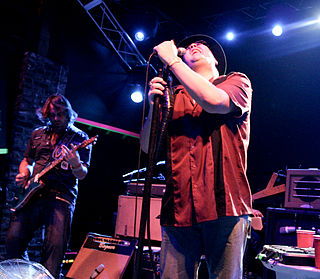
A jam band is a musical group whose concerts and live albums substantially feature improvisational "jamming." Typically, jam bands will play variations of pre-existing songs, extending them to improvise over chord patterns or rhythmic grooves. Jam bands are known for having a very fluid structure, playing long sets of music which often cross genre boundaries, varying their nightly setlists, and segueing from one song into another without a break.
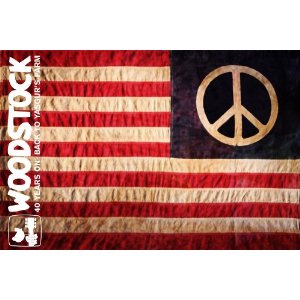
Woodstock 40 Years On: Back to Yasgur's Farm is a six-CD live box-set album of the 1969 Woodstock Festival in Bethel, New York. Its release marked the 40th Anniversary of the festival.
References
- 1 2 Raskin, Jonah (August 14, 2019). "Woodstock Nation Revisited: Abbie Hoffman, Joan Baez and the Culture Vultures of Capitalism". CounterPunch . Retrieved October 5, 2023.
- ↑ Hoffman, Jack; Simon, Daniel (February 18, 2020). "The Book That Began as an Acid-Fueled Speech at Woodstock". LitHub . Retrieved October 5, 2023.
- ↑ Carson, Tom (August 15, 2019). "Woodstock glorified them. Tarantino barbecued them. In 2019, whither the hippie?". Archived from the original on September 29, 2022. Retrieved October 5, 2023.